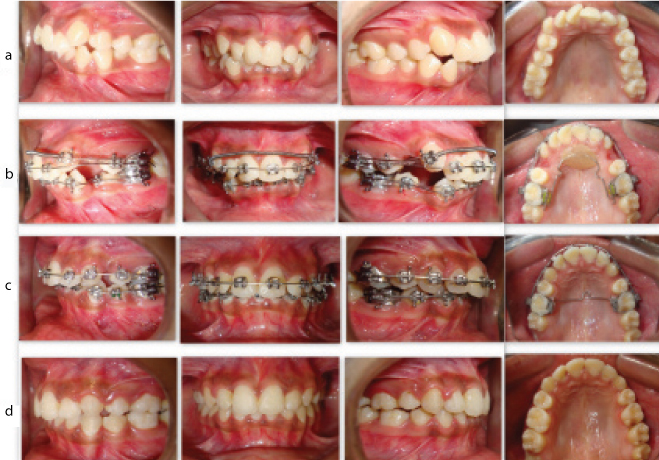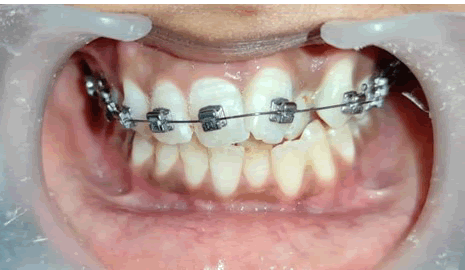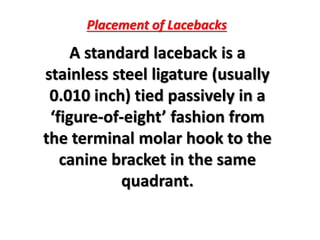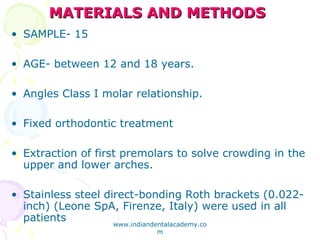
PDF] The effectiveness of laceback ligatures during initial
4.5 (135) In stock

4.5 (135) In stock
There is no evidence to support the use of lacebacks for the control of the sagittal position of the incisors during initial orthodontic alignment. Lacebacks may be used to limit unwanted incisor proclination during initial orthodontic alignment; however, their use has not met with universal approval. This systematic review aims to appraise the evidence in relation to the effectiveness of lacebacks in controlling incisor position during initial alignment. Electronic database searches of published literature (MEDLINE via Ovid, Cochrane Central Register of Controlled Trials, LILACS, and IBECS) and unpublished literature were performed. Search terms used included randomized controlled trial, controlled clinical trial, random allocation, double blind method, orthodontics, and laceback. Data were extracted using custom forms. Risk of bias assessment was made using the Cochrane Collaboration risk of bias tool. The quality of the evidence was also assessed using GRADE. Mean differences in incisor inclination and antero-posterior changes in incisor and molar position during alignment were calculated. Two studies involving 97 participants were found to be at low risk of bias and were included in the quantitative synthesis. The random effects meta-analysis demonstrated that the use of lacebacks was associated with 0.5 mm greater posterior movement of the incisors during alignment; this finding was of limited clinical importance and statistically non-significant [95 per cent confidence interval (CI): -1.25, 0.25, P = 0.19]. Little difference (0.46 mm) was also found between laceback and non-laceback groups with regards to mesial molar movement (95 per cent CI: -0.33, 1.24, P = 0.26). According to the GRADE assessment, the overall quality of evidence relating to the use of lacebacks was high. There is no evidence to support the use of lacebacks for the control of the sagittal position of the incisors during initial orthodontic alignment.

PDF] The effectiveness of laceback ligatures during initial orthodontic alignment: a systematic review and meta-analysis.

image.slidesharecdn.com/effectoflacebacksinmaxilla

SciELO - Brasil - Effects of active and passive lacebacks on antero-posterior position of maxillary first molars and central incisors Effects of active and passive lacebacks on antero-posterior position of maxillary first

PDF) The effectiveness of laceback ligatures: A randomized controlled clinical trial

PDF) The effectiveness of laceback ligatures during initial orthodontic alignment: a systematic review and meta-analysis Reply

JCDR - Alignment, Canine lacebacks, Incisor crowding, Open coil springs, Sliding mechanics

Effectiveness of microosteoperforations in accelerating alignment of maxillary anterior crowding in adults: A randomized controlled clinical trial - ScienceDirect

Initial Alignment

An Elaborate Review on Self-Ligating Bracket System

orthodontic initial alignmen.pptx

PDF] The effectiveness of laceback ligatures during initial orthodontic alignment: a systematic review and meta-analysis.

SciELO - Brasil - Effects of active and passive lacebacks on antero-posterior position of maxillary first molars and central incisors Effects of active and passive lacebacks on antero-posterior position of maxillary first

PDF) The effectiveness of laceback ligatures during initial

PDF] The effectiveness of laceback ligatures during initial orthodontic alignment: a systematic review and meta-analysis.

image.slidesharecdn.com/effectoflacebacksinmaxilla